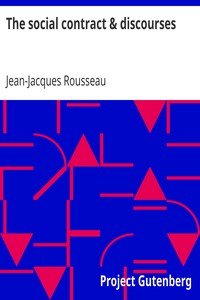The social contract & discourses by Jean-Jacques Rousseau
"The Social Contract & Discourses" by Jean-Jacques Rousseau is a foundational work of political philosophy written in the late 18th century. The text explores the relationship between individuals and the state, examining how legitimate political authority can be established and justified. Central to Rousseau's argument is the idea of the social contract, which posits that individuals collectively agree to form a society that is governed by the general will aimed at the
common good. At the start of the work, Rousseau provocatively states, “Man is born free; and everywhere he is in chains,” indicating his exploration of how social and political structures often oppress human freedom. He questions the legitimacy of authority derived from force and differentiates between natural and societal bonds, suggesting that while the family represents the first natural society, political institutions must be based on mutual consent and conventions. By delving into these themes, Rousseau sets the stage for a deeper inquiry into the nature of freedom, the role of government, and the principles that underpin legitimate social orders. (This is an automatically generated summary.)
Read or download for free
| How to read | Url | Size | |||
|---|---|---|---|---|---|
| Read now! | https://www.gutenberg.org/ebooks/46333.html.images | 769 kB | |||
| EPUB3 (E-readers incl. Send-to-Kindle) | https://www.gutenberg.org/ebooks/46333.epub3.images | 504 kB | |||
| EPUB (older E-readers) | https://www.gutenberg.org/ebooks/46333.epub.images | 515 kB | |||
| EPUB (no images, older E-readers) | https://www.gutenberg.org/ebooks/46333.epub.noimages | 357 kB | |||
| Kindle | https://www.gutenberg.org/ebooks/46333.kf8.images | 801 kB | |||
| older Kindles | https://www.gutenberg.org/ebooks/46333.kindle.images | 776 kB | |||
| Plain Text UTF-8 | https://www.gutenberg.org/ebooks/46333.txt.utf-8 | 725 kB | |||
| Download HTML (zip) | https://www.gutenberg.org/cache/epub/46333/pg46333-h.zip | 475 kB | |||
| There may be more files related to this item. | |||||
About this eBook
| Author | Rousseau, Jean-Jacques, 1712-1778 |
|---|---|
| Translator | Cole, G. D. H. (George Douglas Howard), 1889-1959 |
| Title | The social contract & discourses |
| Alternate Title | The social contract and discourses |
| Series Title | Everyman's library |
| Credits | E-text prepared by Marc D'Hooghe (www.freeliterature.org) from page images generously made available by the Google Books Library Project (books.google.com) |
| Reading Level | Reading ease score: 46.6 (College-level). Difficult to read. |
| Language | English |
| LoC Class | JC: Political science: Political theory |
| Subject | Economics |
| Subject | Political science -- Early works to 1800 |
| Subject | Social contract |
| Category | Text |
| EBook-No. | 46333 |
| Release Date | Jul 19, 2014 |
| Most Recently Updated | Jul 20, 2025 |
| Copyright Status | Public domain in the USA. |
| Downloads | 3697 downloads in the last 30 days. |
| Project Gutenberg eBooks are always free! | |

